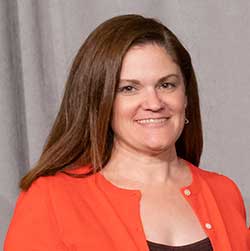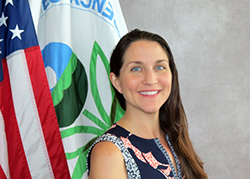Federal Facilities Online Academy: Coordinating with Tribes at Federal Facilities
Sponsored by: US EPA Federal Facilities Restoration and Reuse Office (FFRRO)
Archived: Monday, December 2, 2019
Federal Facilities Online Academy: Coordinating with Tribes at Federal Facilities
2019-12-02
US EPA Federal Facilities Restoration and Reuse Office (FFRRO)
Coordinating with Tribes at Federal Facilities is a two-hour webinar course that will provide an overview of Environmental Protection Agency (EPA) policy on consultation and coordination with Indian Tribes at federal facilities. This webinar will also provide tips on how to work more collaboratively during this process. By taking this course, participants will achieve the following objectives:
- Identify EPA processes and policies for interacting with the Tribes;
- Understand the roles of EPA and tribal governments in Federal Facility clean ups;
- Learn about the Federal Facilities Restoration and Reuse Office (FFRRO); and,
- Discover EPA resources and tools available to assist Federal Facilities in building partnerships with the Tribes;
The instructional methodology for this course includes lecture, group discussions, and case studies. There will also be an opportunity for participants to ask questions. The target audience for this course is federal, state, and tribal representatives who work on Federal Facility cleanups. Ideally, students should have a basic understanding of the Comprehensive Environmental Response, Compensation, and Liability Act (CERCLA) process. This course is part of the Federal Facilities Academy training program. Please consider registering for other Federal Facility Academy courses and obtain a certificate upon completion of the entire Federal Facility Academy series (12 courses total).
Upcoming Federal Facilities Online Academy Webinars
Accessibility, Recording, and Content Disclaimer
Rehabilitation Act Notice for Reasonable Accommodation
It is EPA's policy to make reasonable accommodation to persons with disabilities wishing to participate in the agency's programs and activities, pursuant to the Rehabilitation Act of 1973, 29 U.S.C. 791. Any request for accommodation should be made to Emerald Laija at 202-564-2724 or Laija.Emerald@epa.gov, preferably one week or more in advance of the webinar, so that EPA will have sufficient time to process the request. EPA would welcome specific recommendations from requestors specifying the nature or type of accommodation needed. Please note that CLU-IN provides both alternate phone call-in options and closed captioning for all webinars, and requests for these specific accommodations are not necessary.
Webinar Recording
By participating in this CLU-IN webinar, you automatically agree to authorize recording of audio and visual content presented during this live event and consent to subsequent use of this recording in the public domain by the U.S. Environmental Protection Agency. This recording may include questions, comments and poll responses provided by you during the live event in addition to your name, voice, image or likeness. This recording will be made available after the conclusion of the live event as part of the CLU-IN webinar archives, and will remain available indefinitely. If you do not wish to consent to the recording, please do not join the live event, and contact Jean Balent at 202-566-0832 or balent.jean@epa.gov to discuss your concerns.
Content Disclaimer
This webinar is intended solely to provide information to the public. The views and opinions expressed as part of this webinar do not necessarily state or reflect those of the U.S. Environmental Protection Agency. It is not intended, nor can it be relied upon, to create any rights enforceable by any party in litigation with the United States, or to endorse the use of products or services provided by specific vendors. With respect to this webinar, neither the United States Government nor any of their employees, makes any warranty, express or implied, including the warranties of merchantability and fitness for a particular purpose, or assumes any legal liability or responsibility for the accuracy, completeness, or usefulness of any information, apparatus, product, or process disclosed, or represents that its use would not infringe privately owned rights.
Presenters:
 Emy Laija, EPA Federal Facilities Restoration and Reuse Office (Laija.emerald@Epa.gov or 202-845-3198)
Emy Laija, EPA Federal Facilities Restoration and Reuse Office (Laija.emerald@Epa.gov or 202-845-3198)
Emy Laija is an Environmental Scientist who works on Superfund cleanups of hazardous waste sites through the EPA Federal Facility Restoration and Reuse Office (FFRRO) in Washington, DC. Her position includes implementing national policy, promoting consistency in cleanups, developing training, and developing relationships with other federal agencies and stakeholders. Before working in FFRRO, Emerald worked as a Remedial Project Manager for 8 years in EPA's Hanford Project Office in Richland, WA and continues to serve as a Hanford subject matter expert. She earned a Master's Degree focused in Environmental Studies from University of Nevada-Las Vegas and a Bachelor's Degree from the University of Texas at El Paso.
 Amanda Van Epps, U.S. EPA Office of Superfund Remediation and Technology Innovation (vanepps.amanda@epa.gov or 202-566-0995)
Amanda Van Epps, U.S. EPA Office of Superfund Remediation and Technology Innovation (vanepps.amanda@epa.gov or 202-566-0995)
Amanda Van Epps is an environmental engineer in the Superfund program at the U.S. Environmental Protection Agency. She is a Superfund tribal coordinator in addition to her work on post-construction policy. In addition to nearly nine years at EPA, she has experience in environmental consulting on site remediation as well as in research focusing on biological treatment processes. She has a bachelor's degree in chemical engineering and graduate degrees in civil and environmental engineering and public affairs.
 Mary Cooke, US EPA Federal Facilities Restoration Reuse Office (cooke.maryt@epa.gov or 202-564-0788)
Mary Cooke, US EPA Federal Facilities Restoration Reuse Office (cooke.maryt@epa.gov or 202-564-0788)
Mary Cooke is an Environmental Scientist in EPA's Federal Facilities Restoration and Reuse Office (FFRRO) in the Office of Land and Emergency Management (OLEM). Mary is the FFRRO lead for PFASs, Emerging Contaminants, Consistency and Site Assessment among other duties.
Mary joined the federal government in 1998 as an NPL and BRAC remedial project manager for EPA Region III in Philadelphia. She holds a bachelor's degree in Earth Science with minors in Geography and Marine Science from Pennsylvania State University, and a master's degree in Environmental Pollution Control, also from Penn State.
Moderator:
 Jean Balent, U.S. EPA Technology Innovation and Field Services Division (balent.jean@epa.gov or 202-566-0832)
Jean Balent, U.S. EPA Technology Innovation and Field Services Division (balent.jean@epa.gov or 202-566-0832)
Ms Balent is on the staff of the EPA's Technology Innovation and Field Services Division where she has worked to collect and disseminate hazardous waste remediation and characterization information since 2003. Ms Balent manages the Clean Up Information Network website and actively supports online communication and collaboration resources available to EPA. She formerly worked with the US Army Corps of Engineers Environmental Engineering Division in the Buffalo District. Ms Balent was also a member of the SUNY-Buffalo Groundwater Research Group where she constructed and tested large scale models of groundwater flow. Ms Balent has also conducted research relating to the Great Lakes, environmental remediation, and brownfields re-development. She holds a Bachelor's degree in environmental engineering from SUNY-Buffalo and a Master's degree in Information Technology from AIU.
Webinar Slides and References:
Webinar Slides and References:
Additional Resources:
 Federal Facilities Academy Training Tracker (54KB/XLS)
Federal Facilities Academy Training Tracker (54KB/XLS) United States Environmental Protection Agency, (1984). "EPA Policy for the Administration of Environmental Programs on Indian Reservations"
United States Environmental Protection Agency, (1984). "EPA Policy for the Administration of Environmental Programs on Indian Reservations"
- Executive Order No. 13175, (2000). Summary available
 United States Environmental Protection Agency, (2011). "Policy on Consultation and Coordination with Indian Tribes"
United States Environmental Protection Agency, (2011). "Policy on Consultation and Coordination with Indian Tribes" - United States Environmental Protection Agency, Federal Facilities Restoration and Reuse Office Fed Facs.
- Executive Order No. 12580, (1987), 3 C.F.R., p.193 (EO 12580)
 United States Environmental Protection Agency, Federal Facilities Restoration and Reuse Office Fed Facs (2018). "FFRRO and the FFRRO Tribal Program".
United States Environmental Protection Agency, Federal Facilities Restoration and Reuse Office Fed Facs (2018). "FFRRO and the FFRRO Tribal Program".
- United States Environmental Protection Agency, Federal Facilities Restoration and Reuse Office Tribal Program.
- United States Environmental Protection Agency, (2011). "Close Out Procedures for National Priorities List Superfund Sites."
 Government Accountability Office, (2019) "EPA Should Improve the Reliability of Data on National Priorities List Sites Affecting Indian Tribes."
Government Accountability Office, (2019) "EPA Should Improve the Reliability of Data on National Priorities List Sites Affecting Indian Tribes." - United States Environmental Protection Agency, Cleanups in My Community.
- United States Environmental Protection Agency, American Indian Environmental Office (Office of International and Tribal Affairs).
- Agency for Toxic Substances and Disease Registry (ATSDR),
 United States Environmental Protection Agency, (2016). "EPA Policy on Consultation and Coordination with Indian Tribes: Guidance for Discussing Tribal Treaty Rights".
United States Environmental Protection Agency, (2016). "EPA Policy on Consultation and Coordination with Indian Tribes: Guidance for Discussing Tribal Treaty Rights".
- United States Environmental Protection Agency, (2017). "Considering Traditional Ecological Knowledge during the Cleanup Process."
 United States Environmental Protection Agency, (2017). "Consideration of Tribal Treaty Rights and Traditional Ecological Knowledge in the Superfund Remedial Program."
United States Environmental Protection Agency, (2017). "Consideration of Tribal Treaty Rights and Traditional Ecological Knowledge in the Superfund Remedial Program."  United States Environmental Protection Agency. "Consulting with Indian Tribal Governments at Superfund Sites (A Beginner's Booklet)."
United States Environmental Protection Agency. "Consulting with Indian Tribal Governments at Superfund Sites (A Beginner's Booklet)." - Other Agency Links to Programs
If you have a suggested topic or idea for a future CLU-IN internet seminar, please contact:
Technology Integration and Information Branch
PH: 202-566-0832 | Email: balent.jean@epa.gov
Technology Integration and Information Branch
PH: 202-566-0875 | Email: adam.michael@epa.gov





